|
The Hellenic Genocide
Quotes from historical documents and related Photos. |
|||
CHAPTER V: "The ferocious expulsion and terrorizing by murder and violence of the Rayas along the Asia Minor littoral, which has not attracted the attention it merits, has all the earmarks of a war measure, prompted by alleged "military necessity," and there is no doubt that Turks and Germans were allies during the war and were in complete cooperation. A study of this question may be found in Publication No. 3, of the American Hellenic Society, 1918, in which the statement is made that one million, five hundred thousand Greeks were driven from their homes in Thrace and Asia Minor, and that half these populations had perished from deportations, outrages and famine." CHAPTER V: "The violent and inflammatory articles in the Turkish newspapers, above referred to, appeared unexpectedly and without any cause. They were so evidently "inspired" by the authorities, that it seems a wonder that even ignorant Turks did not understand this. Cheap lithographs were also got up, executed in the clumsiest and most primitive manner—evidently local productions. They represented Greeks cutting up Turkish babies or ripping open pregnant Moslem women, and various purely imaginary scenes, founded on no actual events or even accusations elsewhere made. These were hung in the mosques and schools. This campaign bore immediate fruit and set the Turk to killing, a not very difficult thing to do." CHAPTER V: "A series of sporadic murders began at Smyrna as at Saloniki, the list in each morning’s paper numbering from twelve to twenty. Peasants going into their vineyards to work were shot down from behind trees and rocks by the Turks. One peculiarly atrocious case comes to mind: Two young men, who had recently finished their studies in a high-grade school, went out to a vineyard to pass the night in the coula (house in the country). During the night they were called to the door and chopped down with axes. Finally the Rayas, to the number of several hundred thousand, were all driven off from their farms or out of their villages. Some were deported into the interior, but many managed to escape by means of caiques to the neighboring islands, whence they spread over Greece. A few thousand Turks destroyed the region, which the Greeks were developing and rendering fertile, from Pergamus clear down the coast to Lidja. I went over the whole region and took photographs of the ruined farmhouses and villages. Goats had been turned into flourishing, carefully tended vineyards and acres of roots had been dug up for fuel." CHAPTER V: "Both at this time and during the progress of the Great War, the Rayas were drafted into the army where they were treated as slaves. They were not given guns, but were employed to dig trenches and do similar work, and as they were furnished neither food, clothing nor shelter, large numbers of them perished of hunger and exposure." CHAPTER VI: "THE complete and documentary account of the ferocious persecutions of the Christian population of the Smyrna region, which occurred in 1914, is not difficult to obtain; but it will suffice, by way of illustration, to give only some extracts from a report by the French eye-witness, Manciet, concerning the massacre and pillage of Phocea, a town of eight thousand Greek inhabitants and about four hundred Turks, situated on the sea a short distance from Smyrna. The destruction of Phocea excited great interest in Marseilles, as colonists of the very ancient Greek town founded the French city. Phocea is the mother of Marseilles. Monsieur Manciet was present at the massacre and pillage of Phocea, and, together with three other Frenchman, Messieurs Sartiaux, Carlier and Dandria, saved hundreds of lives by courage and presence of mind." CHAPTER VI: ""During the night the organized bands continued the pillage of the town. At the break of dawn there was continual "tres nourrie" firing before the houses. Going out immediately, we four, we saw the most atrocious spectacle of which it is possible to dream. This horde, which had entered the town, was armed with Gras rifles and cavalry muskets. A house was in flames. From all directions the Christians were rushing to the quays seeking boats to get away in, but since the night there were none left. Cries of terror mingled with the sound of firing. The panic was so great that a woman with her child was drowned in sixty centimeters of water."" CHAPTER VI: ""Mr. Carlier saw an atrocious spectacle. A Christian stood at his door, which the bandits wished to enter, as his wife and daughter were in the house. He stretched out his arms to bar the way. This motion cost him his life for they shot him in the stomach. As he was staggering toward the sea, they gave him a second shot in the back, and the corpse lay there for two days."" CHAPTER VI: ""Fortunately there were two steamers in port, and we managed to embark the unfortunate Christians in small groups. Despite all our efforts, these wretched people were in such haste to depart that they upset the small boats. An odious detail proved the cynicism of this horde, which, under pretext of disarming those leaving, shamefully robbed these poor, terrified people of their last belongings. They tore away from old women packages and bedding by force. Anger seized me and I blushed to see these abominations and I told an officer of the gendarmerie that if this did not stop, I would take a gun myself and fire on the robbers. This produced the desired effect, and these unfortunates were enabled to embark with what they had saved from the disaster, which proves that the whole movement could have been easily controlled."" The Hellenic Genocide Quotes from historical documents and related Photos. Previous page | Initial page | Site Map | Next page (17th of 29) |
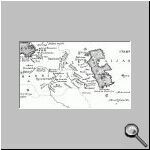
Van to Tabriz.
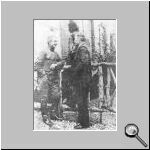
Topal Osman, Kemal Pasha and Ismet Inonou.
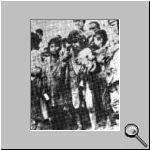
Orphans.
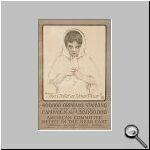
"The Child at Your Door"
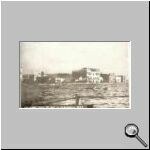
Buildings on fire at the quay of Smyrna.
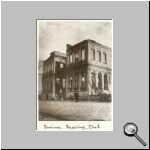
The Sporting Club of Smyrna. Burnt.
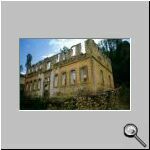
Remains of an Hellenic school in Pontos.
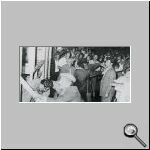
"Today your property. Tomorrow your lives!"
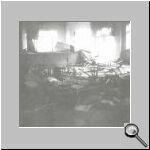
The destroyed Church of Evangelistrias.
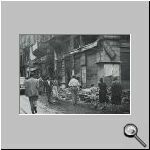
People looking at destroyed Hellenic property.